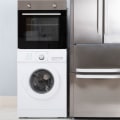In addition, appliance manufacturers struggle to keep up with changing consumer demands. As technology becomes more efficient, certain aspects of the products that can be purchased are expected. Consumers want their products to be lightweight, compact and stylish. Household appliance manufacturers cannot meet these purchasing requirements to keep up to date while building old, sturdy machines.
The new components they use are intrinsically more delicate and their lightness makes them more fragile. However, the fact that this new generation of household appliances has a shorter service life does not mean that they are all bad. In fact, they have a lot of advantages. Manufacturers only offer one-year warranties, which often forces you to scrap fairly new appliances because repair costs are high and parts are in short supply.
Now, your appliance is likely to last much longer than the average life expectancy prescribed for new appliances today. According to Department of Energy appliance standards, manufacturers are developing new, more efficient appliances that save consumers money on their energy bills. A 2- to 10-year homebuyer warranty service agreement covers repair or replacement of appliances and systems, including labor and parts-related costs. Let's take a look at the data behind the reliability of modern household appliances and consider some ways in which you can protect yourself from unexpected repair and replacement costs.






